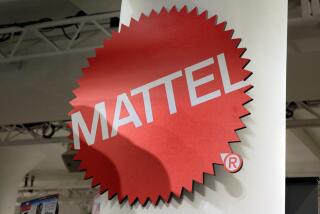Vicks Rejects $1.24-Billion Unilever Bid : Calls Merger Offer Inadequate, Begins Preparing a Defense
- Share via
NEW YORK — Cosmetics and toiletries maker Richardson-Vicks on Monday rejected an unsolicited, $1.24-billion merger offer from Unilever NV that was designed to give the giant European-based consumer products company a further foothold in the U.S. market.
Richardson-Vicks, known for its Vicks, Oil of Olay and Vidal Sassoon brands, said the $54-a-share cash offer for all of its 23 million outstanding shares was “inadequate.”
The Wilton, Conn.-based firm said it was preparing a defense against a possible hostile takeover bid, arranging $300 million in financing to buy up to 5 million, or 22%, of its shares on the open market. It said it is considering the use of other securities to buy additional shares.
In a statement, two members of the family that founded and runs the company said they intend to increase their already large stake.
Stuart Richardson, the chairman, and Smith Richardson, a director and former chairman, said the family “considers the stock to be an attractive investment” and intends to increase its stake “substantially.”
Study of Protection
Richardson-Vicks said it will study “other methods to protect long-term shareholders’ interests.”
Officials of Unilever, which is based in London and Rotterdam, had no immediate comment on whether they intended to mount an unfriendly takeover offer.
Chairman Floris Maljers said in a statement that he hopes that Richardson-Vicks “will re-examine its position and that we can work together to achieve this very important and mutually beneficial merger.”
A Unilever spokesman in New York declined to confirm Richardson-Vicks’s claim that Unilever had declared that it would cease its overtures if its offer were rejected by Richardson-Vicks’s board.
Unilever, which made its offer last Saturday, currently has no Richardson-Vicks shares, the spokesman said.
Richardson-Vicks has been a rumored takeover target for some months, but company officials have dismissed such speculation, noting the difficulty that a raider would face in light of the large stake held by the family, family trusts and company employees and executives. That stake already totals 7.3 million shares, or 32% of the total.
Richardson-Vicks last year voted charter changes designed to hinder any unfriendly takeover attempt. They included staggered terms for its directors.
“This surprised me,” said Diane Mustain, an analyst with Chicago brokers Duff & Phelps. With the family’s large holdings, “any takeover attempt really faces some difficulty,” she said.
Another analyst, Deepak Raj of the Merrill Lynch brokerage, said the offer amounted to 18 times projected 1986 earnings and was at that level “very fair.”
Most Active Stock
For the year that ended last June 30, Richardson-Vicks reported earnings of $72 million on revenue of $1.2 billion. Its stock was the most active on the New York Stock Exchange on Monday, closing up $6.125 a share to $46.125 in trading of 4.8 million shares.
Speculation about a takeover of Richardson-Vicks has also centered around Revlon, the toiletries and cosmetics firm, and American Cyanamid, the chemical and toiletries company. Neither company has confirmed an interest in Richardson-Vicks, however.
Unilever, with 1984 sales of $18.8 billion, makes foods, detergents and toiletries, including such well-known brands as Lipton tea, Lever Bros. home products, Lux soaps and Pepsodent and Aim toothpastes. The company has declared its interest in expanding in the United States to strengthen its position against such worldwide competitors as Procter & Gamble and Colgate-Palmolive.
Spokesman Humphrey Sullivan said the company has more than $1 billion cash with which to pursue its announced acquisition program.
In a statement, Unilever said its personal-products businesses would be well complemented by the addition of the Oil of Olay skin-care products, Clearasil skin-care brands, Vicks and NyQuil household medicines and the Vidal Sassoon and Pantene hair-care lines.
Unilever said Richardson-Vicks’s distribution strength in drugstores would complement its distribution in grocery stores.
Unilever has also announced its intention to concentrate on its core businesses and last year divested 12 companies in less related fields, such as transportation and chemicals.
Last September, the company completed its hostile takeover of Brooke Bond Group PLC, a British tea distributor.
More to Read
Inside the business of entertainment
The Wide Shot brings you news, analysis and insights on everything from streaming wars to production — and what it all means for the future.
You may occasionally receive promotional content from the Los Angeles Times.











